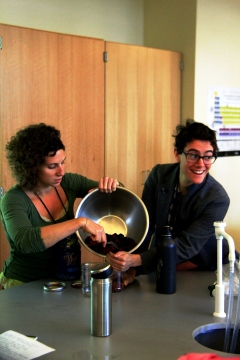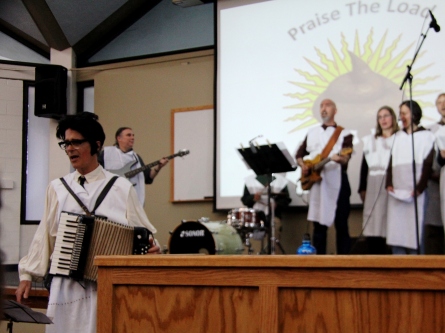Can you recall the city of which you always fantasized about living in? That city you may have visited last spring and your first impression was something like, “DA-A-A-NG! Why can’t my city be more like this?” That city, which is perfect, is every aspect of the word. For me, Asheville is one of those cities. But, it is so idealistic that I could never imagine permanently living in Asheville. That seems to be contradictory, maybe counterintuitive; so, what do I mean? Last summer, I remember talking with some friends back home and somehow we got on this very topic of ideal cities. One of them, a man named Santana, argued against living in an ideal city, he said “Sure, I could go live somewhere like Bloomington or Asheville, but I would have nothing to complain about, nothing to fight for, or work towards accomplishing. That is why I like Nashville, because the streets are still crummy, the land is still wasted, and the people still [irritate me]. It reminds me why I am here—to do my part in making this place better.” Asheville, for many, is too good of a city, but it is an exceptional choice for inspiration. It is a city revived through creative, sustainable methods and efficient use of urban and natural landscape (oh, and money, lots of money). Asheville delivers inspiration as to how to incorporate my community and work towards a better tomorrow.
It seems that everything has been done, but everything has not been incorporated everywhere. In order to initiate the spread of progressive action there first must be a share of knowledge, like a convention of sorts. A convention, of which, that hosts lectures and workshops on sustainable practice. A convention such as, ohhh. . . the Organic Growers School. The 19th annual Organic Growers School was held last weekend as a conference to share the ideas of sustainable, holistic, and green-efficient living and agriculture.
 Just myself posing with Pat Foreman and Oprah Henfry. I guess I’m not much for photogenic portraits.
Just myself posing with Pat Foreman and Oprah Henfry. I guess I’m not much for photogenic portraits.
What exactly did I learn?
Well, for me, I unconsciously gravitated towards classes based on holistic living and resource sustainability. I attended classes on poultry care, food preservation through fermentation, composting (in the form of human manure, traditional compost, vermicompost, and compost tea), making my own herbal and natural medicines, and sustainable agriculture through permaculture production. It was a weekend’s worth of learning for a lifetime’s worth of knowledge and practice.
But, let us tie in my first blog’s topic of an organic lifestyle—how exactly do I implement these skills into making a healthier Earth? Well, there were a few common themes that I picked up throughout this weekend that will help direct me towards an answer.
 As I expressed in my first blog entry, organic is a lifestyle, not just an agricultural market. To grow organic, you must start with yourself. By dedicating to a wholesome lifestyle, the connection between land and man becomes a devotion rather than a career or practice. After all, agricultural production starts with human intervention. Or, does it start with the soil, or the animals, or the plants? A common theme I recognized throughout most the workshops this weekend was that life and harvest do not start from a single cue. All life and growth are based on a cycle. Think about it, an ecosystem, even one undisturbed by man, is never fully closed. The life services and inhabitants are dynamic: there are changes in abiotic (natural disasters, climate, etc.) and biotic factors (introduction and emigration of new organisms, etc.). Systems are balanced by the ability to survive with the provided resources and inhabitants’ traits adapted to utilize those qualities. Life and its cycles are dynamic and competitive; yet life is also astoundingly resourceful.
As I expressed in my first blog entry, organic is a lifestyle, not just an agricultural market. To grow organic, you must start with yourself. By dedicating to a wholesome lifestyle, the connection between land and man becomes a devotion rather than a career or practice. After all, agricultural production starts with human intervention. Or, does it start with the soil, or the animals, or the plants? A common theme I recognized throughout most the workshops this weekend was that life and harvest do not start from a single cue. All life and growth are based on a cycle. Think about it, an ecosystem, even one undisturbed by man, is never fully closed. The life services and inhabitants are dynamic: there are changes in abiotic (natural disasters, climate, etc.) and biotic factors (introduction and emigration of new organisms, etc.). Systems are balanced by the ability to survive with the provided resources and inhabitants’ traits adapted to utilize those qualities. Life and its cycles are dynamic and competitive; yet life is also astoundingly resourceful.
The resilience of nature is not infinite. Although nature recycles itself, there is an issue of excessive outputs from systems. Humans, in such dense populations, are a heavy emaciating species, the most guilty of excessive output. This brings me to the second theme, waste. Notable to this was the lecture I attended on human manure. Now, when discussing human manure, it is hard to get your point across without cracking a few jokes and giggles, well, to prevent that, the class was presented in a ridiculously comical fashion. The speaker was (Ir)reverend Bill Whipple, accompanied by his entourage of toilet paper adorned choir. 
(Ir)reverend Bill and his Choir singing feces-related gospel renditions
The presentation was ludicrous, but its message was serious. The speaker addressed how the sewage system is a concentrated, or centralized, system which requires a great amount of energy to collect, sanitize, and reincorporate back into water way systems (about 1/3 of Asheville’s energy resource goes towards water transport). The water may be recycled into a questionable form of potable water; but, the hundreds of thousands of kilowatts derived from nonrenewable resources will not be recycled in the same state they were originally extracted. Those mountains stripped for coal will never shadow valleys so high and those toxic fumes produced to generate the energy will continually linger in our lungs. The final message boiled down to this: why would we waste something we need (in this case water, coal, etc.)?
But, let us come back to the original question. What is the point of conventions such as the Organic Growers School? What do I do with these skills that I have learned? More to the point, how do I utilize them to better the planet and remediate that of which has been depleted from the planet? Remember how I said everything has been done, but not everything has been incorporated everywhere? Well, that is where this knowledge comes in to place. In order to promote a sustainable world, I must be a vector to share and practice the knowledge that I possess. In other words, I must be one half teacher, one half preacher, and consistently practicing what I preach/teach.
Practice is by far the most important element. If I choose to slack off or give up, then I am choosing to forfeit everything I worked for and believed in. That may be a tad drastic to say. But consistent practice delivers momentum. The more exposure I have to all these things the greater my conviction and dedication will grow. This momentum is crucial. When I first saw all these new-age treatments and methods my first impression was, “how could I ever do this?” But I must remember, that everything new is actually easy (to the degree of necessary labor and demand)—once you get it all going. Once things are familiar, or routine, they become less daunting and more practical.
In summary, integration, routinely, and discipline makes all things practical. Knowledge is the tool, sharing knowledge is the vehicle, and practice is the proof. Everyone wants to be a hero, but we dream on such large scale. If you really want to improve the world, start small: start with yourself, and then evoke just one person to do the same.



